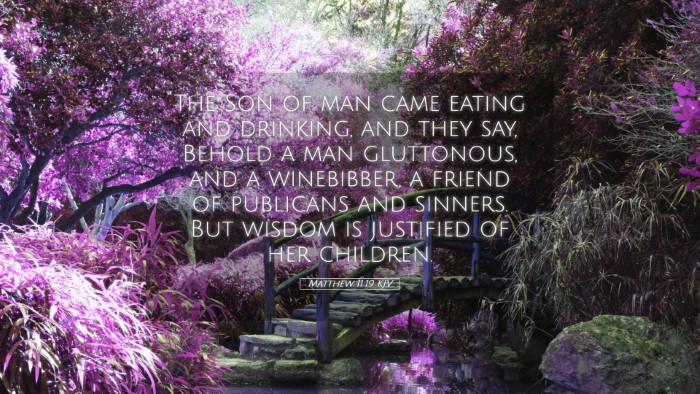Bible Commentary on Matthew 11:19
Matthew 11:19 states, "The Son of Man came eating and drinking, and they say, 'Look at him! A glutton and a drunkard, a friend of tax collectors and sinners!' Yet wisdom is justified by her deeds." This verse encapsulates the profound implications of Jesus' ministry and the societal reactions it elicited.
Contextual Background
This passage occurs in the broader context of Jesus discussing John the Baptist and the contrasting responses of the people to both figures. The criticism Jesus faces reveals societal norms regarding righteousness and the expectations of the Messiah.
Interpretation of Jesus' Actions
Eating and Drinking: The phrase "came eating and drinking" indicates Jesus’ approach to ministry, which was relational and community-oriented. His fellowship with people, including those marginalized or deemed sinful, emphasizes God's grace and inclusivity.
Matthew Henry notes that the actions of Jesus highlight the importance of association with the outcasts to demonstrate the heart of God's mission. He insists that the Son of Man's lifestyle was a stark contrast to the asceticism exemplified by John the Baptist.
The Accusations Against Jesus
The terms "glutton" and "drunkard" reflect the slanderous and misleading judgments made against Jesus. Albert Barnes comments on how these accusations stem from a misunderstanding of Jesus' mission and His freedom in partaking in human experiences.
-
Misinterpretation of Freedom: The social elite criticized Jesus for mingling with those they labeled as immoral. This indicates a tendency to judge appearances rather than the intentions behind actions.
-
Contrast with John the Baptist: John lived a life of austerity, yet faced contempt, leading people to question what they truly wanted in a prophet. The comparison illustrates the fickleness of human judgment.
Theological Implications
Adam Clarke emphasizes the theological implications inherent in this verse. Jesus not only engages with those of ill-repute but elevates humanity’s understanding of righteousness—leading them to recognize that God's love extends beyond moral boundaries.
Wisdom Justified: The phrase "Yet wisdom is justified by her deeds" serves as a powerful conclusion to the verse. This implies that true wisdom is evidenced through the results of one's actions, aligning with the outcomes of Jesus' ministry which bore fruit in transformed lives.
-
Discerning True Wisdom: Critics often fail to perceive the deeper truths illustrated through Jesus' interactions and the outcomes of these relationships.
-
Life Transformation: The lives changed through Jesus' ministry stand as evidence of divine wisdom, affirming that His methods, though misunderstood, were effective in fulfilling God's plan.
Practical Applications
For pastors, students, and theologians, Matthew 11:19 serves as a call to reevaluate our own judgments and the ways we engage with society. It challenges the expectations we place on others in light of their past or present circumstances.
-
Embrace Relational Ministry: The passage encourages a focus on building relationships with diverse individuals, recognizing the value they bring to the community and the possibility of transformation.
-
Challenge Social Norms: Jesus’ example invites believers to challenge societal norms that isolate or condemn rather than include and lift up.
-
Fruit of Ministry: Evaluate your ministry's effectiveness not merely by adherence to tradition but by the tangible outcomes that reflect the love and grace of God.
Conclusion
Matthew 11:19 encapsulates the essence of Jesus' approach to ministry—one that is characterized by grace, understanding, and transformative love. This commentary drawn from various public domain resources highlights the misunderstandings surrounding Jesus’ actions and invites all believers to embrace a vision of wisdom that is evidence in loving deeds.


